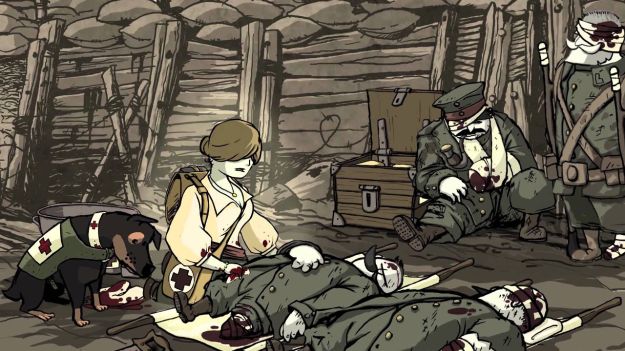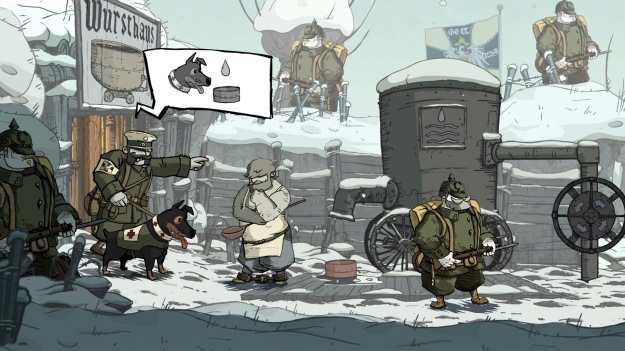Valiant Hearts: The Great War is not your average video game. It’s a historical story that wants you to experience the horrific nature of war without you ever picking up a gun.
Ubisoft Montpellier has a unique perspective for Valiant Hearts: The Great War. They were more interested in telling a story with “a game about war,” and not a “war game.” They definitely succeeded in what they set out to do.
The game’s setting is the very real and now one hundred year-old conflict known as World War I. Throughout the War, the protagonist changes hands through a few different characters, each with their own nationality and role in the conflict. Valiant Hearts: The Great War isn’t a game about evil Nazi’s (ok, there is one!) but is more about the unnecessary evil of Mankind that took place during the years the battle raged on.
It’s refreshing to play a game that’s attempting to explore the things happening around you, as opposed to having to just get to the next checkpoint after killing waves of bad guys. My body count after getting through this game, including every character I played combined was somewhere in the vicinity of zero.
I’m reluctant to say there isn’t much action in this game – because there is. However, as a player, many of the game’s sequences involve running, dodging and generally avoiding bullets and explosions. At no point in this game are you given a gun and put in a sequence where you can shoot someone. Does that sound strange? One of Valiant Hearts: The Great War’s best accomplishments is the fact that within an hour of playing it, not shooting people feels as natural as the alternative in every other game.
Valiant Hearts: The Great War is a game about puzzles. Whether you’re playing as Anna the Belgian nurse who treats any soldier, regardless of nationality or Karl, the drafted German soldier who just wants to be reunited with his french wife, you will be solving dilemma after dilemma with your brain. Some of them involve simply finding lost parts to get a vehicle working or trading supplies with soldiers until you get the tools you need. More difficult puzzles have you deciphering codes and using your canine helper, Walt, to retrieve items and activate levers to secure your passage. This may sound like it would get repetitive but Ubisoft Montpellier keeps it interesting with a frequent change in settings, characters and situations throughout the game.
There is no difficulty setting in the game and most of the problem solving will come rather naturally to the average puzzle gamer. However, the few times I did find myself slightly lost on how to advance the scenario, Valiant Hearts: The Great war provided me with an optional hint. There are three hints total for each puzzle, each unlocking about a minute after the previous one was viewed, giving the player a chance to figure out the objective on their own before the progressively more helpful hints present themselves.
Where Valiant Hearts: The Great War succeeds the most is the emotional connection it naturally has you forge with each of its characters. Each of them has their high and low points and you feel right there with the protagonist’s each time the story hits one of them. The unique part about this experience is the fact that there is no dialogue in the game aside from the Narrator who shuffles the plot from location to location.
While you’re solving puzzle after puzzle, you can find trinkets and mementos of the battlefield. These are completely optional and can be viewed in the pause menu to read about actual facts of the War. I found myself scouring for these items and reading the newly provided information of each with actual interest.
Valiant Hearts: The Great War is a unique and interesting experience. It’s refreshing to play a title that is trying something different from the mainstream and actually succeeding quite well at it. It has an emotionally engaging story with an ending that not only fits well but leaves an impression on you based on the realistic nature of it.
















